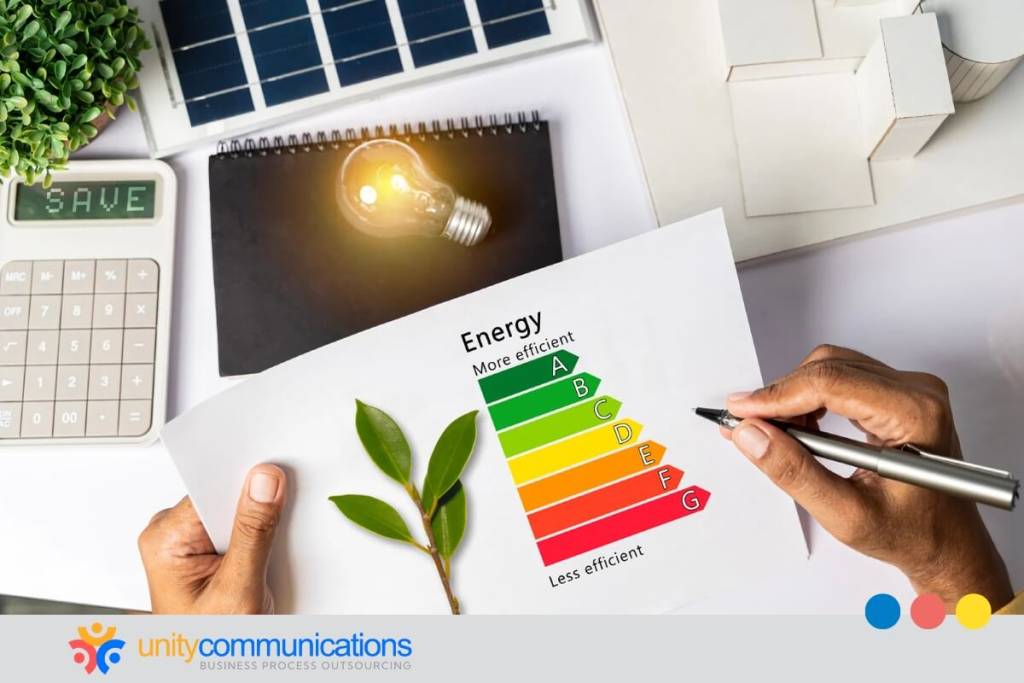IN THIS ARTICLE
Table of Contents
Energy regulations significantly impact business process outsourcing (BPO) operations by influencing costs, environmental strategies, operational efficiency, client relationships, and overall business strategy.
Amid a rapidly evolving global business landscape, staying informed about relevant regulations, adopting energy-efficient practices, and integrating sustainability into business operations is essential for the long-term success of BPO companies.
This article discusses the relationship between BPO and energy regulations and ways to stay compliant. Keep reading to learn more.
Overview of the BPO industry and key energy regulations affecting it

The BPO industry is subject to many laws, and energy regulations are some of them. The energy regulations that affect BPO organizations can vary by country and region. However, some common rules that impact global BPO operations include:
- Energy efficiency standards. Many countries have established energy efficiency standards for buildings, including commercial spaces. BPO companies must comply with these standards to ensure their facilities meet energy efficiency requirements.
- Renewable energy targets. Some regions have set targets for the use of renewable energy sources. BPO companies may be required to incorporate renewable energy technologies or ensure a certain percentage of their energy is from renewable sources.
- Carbon emission reporting and reduction. Regulations might require businesses to measure and report their carbon emissions. BPO companies might need to reduce their carbon footprint to comply with green energy regulations. One way to do this is by implementing energy-efficient technologies and practices.
- Green building certification. BPO facilities may be subject to green building certification standards, such as the Leadership in Energy and Environmental Design (LEED) or Building Research Establishment Environmental Assessment Method (BREEAM) systems. Compliance shows a commitment to sustainable building practices.
- Energy consumption disclosure. Some jurisdictions mandate businesses to disclose their energy consumption and efficiency measures. BPO companies may need to report on their energy usage and demonstrate efforts to reduce consumption.
- Energy management systems (EnMS). Standards such as the International Organization for Standardization (ISO) 50001 provide a framework for establishing energy management systems. BPO companies adopt these systems to systematically improve energy performance and demonstrate compliance with international standards.
- Government incentives and rebates. Governments often offer incentives, rebates, or tax credits for businesses adopting energy-efficient technologies or transitioning to renewable energy sources. BPO companies can utilize these programs to offset the costs of implementing sustainable practices.
- Data center efficiency standards. BPO operations heavily rely on data centers, making regulations related to data center energy efficiency significant. The Green Grid and the European Code of Conduct for Data Centres (EU DC CoC) provide guidelines for optimizing data center energy usage.
- Environmental impact assessments. BPO companies expanding or constructing new facilities may be required to undergo environmental impact assessments. These assessments consider the energy and environmental implications of the expansion or construction project.
- Smart building technologies. Smart building deployments will reach 115 million by 2026. Regulations promoting smart building technologies, such as intelligent lighting, heating, ventilation, and air conditioning (HVAC) systems and building automation, can impact BPO facilities. Compliance with these regulations may enhance energy efficiency.
Impact of energy regulations on BPO operations

So, what is BPO’s relationship with energy regulations?
Energy regulations ensure the responsible and sustainable use of energy resources, promote environmental conservation, and address climate change concerns. They affect BPO operations through the following key aspects:
- Cost implications. Compliance with energy regulations often requires the adoption of energy-efficient technologies and practices. While initial investments are costly, the long-term benefits include reduced energy consumption and lower operating costs for BPO companies.
- Environmental impact. Energy regulations aim to reduce companies’ carbon footprint and promote sustainable practices. Similar to other industries, BPO contributes to greenhouse gas emissions through energy consumption. Adherence to energy regulations promotes environmental conservation and corporate social responsibility.
- Operational efficiency. Implementing energy-efficient technologies and practices not only ensures compliance but also enhances operational efficiency. Efficient energy use can lead to improved equipment performance, reduced downtime, and enhanced productivity in BPO operations.
- Government incentives and penalties. Governments often provide incentives for businesses that comply with energy regulations, such as tax breaks or subsidies. Conversely, non-compliance may lead to penalties and fines. BPO companies must know these incentives and penalties to make informed decisions.
- Client expectations. Clients, especially those focusing on sustainability and corporate responsibility, may prioritize working with BPO providers that adhere to energy regulations. Meeting or exceeding these expectations can enhance the reputation of BPO companies and attract environmentally conscious clients.
- Global standards and certification. Many BPO clients, particularly those from developed countries, expect their service providers to meet or exceed global energy efficiency standards and certifications. Adhering to such standards can open up opportunities for BPO companies in international markets.
- Technology and infrastructure upgrades. Energy regulations often drive technological advancements in energy-efficient infrastructure. BPO companies might need to upgrade their facilities, data centers, and information technology (IT) infrastructure to stay competitive and current.
- Risk management. Non-compliance with energy regulations can pose legal and reputational risks for BPO companies. Proactively addressing and managing these risks is essential for long-term sustainability and success.
Recommendations for achieving energy compliance in BPO

Energy violations in the BPO industry can have various consequences, from legal and financial penalties to reputational damage. The BPO industry should adopt a proactive and comprehensive approach to energy management to maintain compliance with regulations.
Here are some recommendations to help BPO companies ensure adherence:
- Conduct energy audits. Perform regular energy audits to identify energy consumption levels and areas of inefficiency within your facilities. These audits can highlight opportunities for improvement and guide the development of an effective energy management strategy.
- Implement an EnMS. Adopt internationally recognized standards, such as ISO 50001, to establish and maintain an energy management system. The EnMS provides a systematic approach for continuous energy performance improvement and demonstrates a commitment to energy efficiency.
- Invest in energy-efficient technologies. Upgrade equipment and systems to energy-efficient technologies. This step involves upgrading lighting, HVAC systems, and other office equipment. Consider implementing smart building technologies to optimize energy use.
- Integrate renewable energy. Explore opportunities to integrate renewable energy sources, such as solar or wind power, into your operations. Doing so helps reduce reliance on traditional energy sources and demonstrates a commitment to sustainability. In fact, 326 companies opted for 77.4 gigawatts of wind and solar energy in 2022.
- Ensure employee engagement. Foster a culture of energy efficiency among employees. Provide training and awareness programs to educate staff about the importance of energy conservation and encourage their participation in energy-saving initiatives.
- Set energy performance targets. Establish measurable energy performance targets aligned with regulatory requirements. Regularly monitor and assess progress toward these targets, adjusting strategies as needed to achieve optimal results.
- Stay informed about regulations. Establish a dedicated team or designate responsible individuals to stay informed about relevant energy regulations in the regions where the BPO company operates. Regularly update policies and procedures to align with changing regulatory requirements.
- Acquire a green building certification. Consider obtaining green building certifications, such as LEED or BREEAM, for your facilities. Certification provides third-party validation of your commitment to sustainable building practices and may contribute to compliance with certain regulations.
The bottom line
By implementing best practices, BPO companies can achieve energy compliance, realize long-term cost savings, enhance operational efficiency, and contribute to environmental sustainability.
Energy management should be integrated into overall business strategies to create a culture of responsibility and resilience in the face of evolving energy regulations.
Unity Communications is one of the leading BPO companies in the Philippines. Let’s connect to see how we can be of help.





